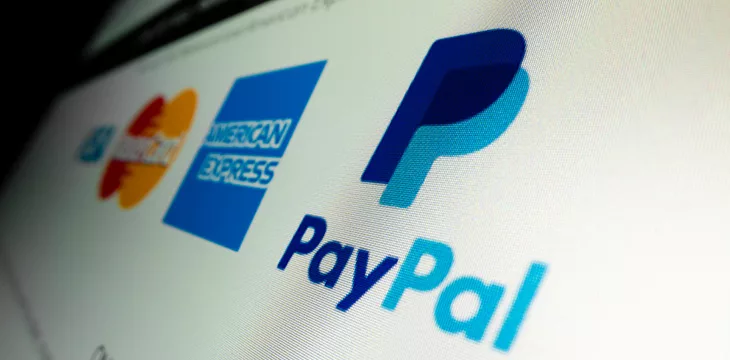|
Getting your Trinity Audio player ready...
|
PayPal (NASDAQ: PYPL) has launched its first stablecoin just as the U.S. government is (belatedly) ratcheting up its oversight of the problematic ‘crypto’ sector.
On Monday, PayPal announced the debut of PayPal USD (PYUSD), a U.S. dollar-denominated, Ethereum-based stablecoin produced in partnership with New York-based Paxos Trust. PayPal says the new stablecoin will be “rolling out in the coming weeks” and will be available to users in U.S. states in which digital asset transactions are legal.
PYUSD is being pitched as good for sending person-to-person payments, transferring to external wallets or funding purchases—although PayPal will convert PYUSD to fiat at the time of purchase as part of its ‘Checkout with Crypto’ feature—and users can convert PYUSD to other PayPal-supported digital assets (BTC, BCH, ETH and LTC) and back again. PYUSD will also be made available “soon” on Venmo, the PayPal-owned mobile P2P payment service.
To encourage adoption, PYUSD will be made available to digital asset exchanges, although the fact that the troubled Huobi exchange was first to welcome the new stablecoin isn’t the most encouraging sign.
PayPal CEO Dan Schulman said the ongoing “shift toward digital currencies requires a stable instrument that is both digitally native and easily connected to fiat currency like the U.S. dollar.”
Starting next month, Paxos will publish a monthly reserve report detailing the assets backing PYUSD, which will consist of “U.S. dollar deposits, U.S. treasuries, and similar cash equivalents.”
How’d we get here
PayPal began allowing customers to buy digital assets a couple years ago and PYUSD has been in the works for some time. However, PayPal pumped the brakes in February after New York’s Department of Financial Services (NYDFS) ordered Paxos to halt further mints of the BUSD stablecoin.
Originally, BUSD was an Ethereum-based partnership of Paxos and the Binance digital asset exchange, but the NYDFS discovered that Binance was minting a separate ‘Binance-Peg BUSD’ that on multiple occasions had a billion or so tokens circulating without any fiat reserves whatsoever.
The U.S. Securities and Exchange Commission (SEC) warned Paxos that it viewed BUSD as an unregistered security and was considering taking legal action against Paxos for failing to register the token. Paxos “categorically” disagreed with the SEC’s view and vowed to “vigorously litigate” should the SEC file civil charges against the firm.
Not much has been said about the matter since the SEC issued its Wells notice in February. Later that month, Paxos CEO Charles Cascarilla said his group was having “constructive discussions” with the SEC. Cascarilla evidently felt emboldened enough by these discussions to follow through with his PayPal partnership—or made the necessary adjustments to Gensler-proof PYUSD.
In June, the SEC filed civil charges against Binance for (among other crimes) selling unregistered securities, including BUSD. The SEC alleged that Binance actively promoted the profit potential of “the BUSD ecosystem,” including the BUSD Reward Program, which included pooling and investing BUSD’s reserve assets, then passing on some of the profits to program participants.
Presumably, neither PayPal nor Paxos intends to market FYUSD as anything other than a digital substitute for the U.S. dollar, with zero profit potential whatsoever.
Birds of a feather
A brief aside regarding Peter Thiel, co-founder of PayPal and funder of Paxos, who studied at Stanford under Prof. Alan Joseph Bankman, father of Sam Bankman-Fried, disgraced founder of the FTX/Alameda scam.
Thiel once referred to Bankman’s tax law course as the “most valuable” of his post-secondary educational experience. This is the same Bankman who, in reference to the Internal Revenue Service’s lack of auditing resources, once declared: “There’s often advantage in being the one who hides something.”
Bankman Sr. was recently revealed as having received millions of dollars from SBF to help fund the latter’s legal defense, money that almost certainly belonged to FTX customers. Bankman was also instrumental in convincing SBF to hire Daniel Friedberg as FTX/Alameda’s primary attorney, a role for which Friedberg has yet to be charged despite his blatant criminal activity.
Honestly, it’s like there’s some mutant DNA strain connecting everyone in ‘crypto.’ If we could identify it, we could test for it and possibly screen out all future fintech chicanery. Thiel has expressed views that border on supporting eugenics; perhaps he wouldn’t be averse to weeding out this tendency from our collective gene pool.
If only there was some solution
Predictably, dozens of fake PYUSD tokens began materializing on multiple blockchains—including Ethereum, Binance’s BNB Smart Chain and Base, Coinbase’s new Ethereum ‘Layer 2’—within hours of PayPal’s Monday announcement.
It’s unclear how many users might have been tricked by these honeypots into depositing legit tokens into these smart contracts that are almost assuredly run by scammers.
Speaking of scam victims, PayPal has been slammed by some of the digital asset space’s more libertarian community after discovering that PYUSD’s code offers the ability for the company to freeze and/or wipe value from wallets containing PYUSD. Similar criticisms have been leveled at other stablecoin issuers who incorporate similar mechanisms into their project’s code.
On BSV blockchain (although possible on all blockchains), this is known as Digital Asset Recovery, an idea that embraces property rights long held sacrosanct in more traditional financial circles. And until ‘crypto’ ditches its ‘Chinatown defense,’ digital assets will forever remain on the fringes of the financial sector.
Cases involving theft of one’s digital assets (or accidental fat-fingering same into the void) shouldn’t mean disaster for blockchain users. Assuming one has the ability to demonstrate ownership and obtain a court order (or legal equivalent), blockchain developers can first freeze then reissue assets at the tip of the chain with a publicly viewable history, thereby restoring order to an otherwise anarchic system.
Off the rails
Like its former partner Binance, whose founder Changpeng ‘CZ’ Zhao recently revealed has a number of new stablecoins in its development pipeline, Paxos is reportedly already discussing ‘white label’ stablecoin opportunities with other firms. Paxos strategy chief Walter Hessert said his firm had been talking with “a lot of the largest technology and financial services companies” about potential stablecoin integration.
But PayPal’s decision to release PYUSD as an ERC-20 token on Ethereum’s main layer is already proving problematic. The company doesn’t appear to have factored in the high cost of so-called ‘gas’ fees that Ethereum imposes to ensure one’s transactions aren’t made to wait forever to be recorded for posterity on the blockchain.
While some critics have suggested PayPal would have been better off to launch PYUSD on one of Ethereum’s countless Layer 2’s, that would be adding yet another layer of complexity to Ethereum’s already overburdened ‘world computer.’
PayPal would have been far wiser to have simply utilized the BSV blockchain for its payment rails, given BSV’s capacity to scale to whatever capacity the markets require. On Tuesday, a single BSV block handled three million transactions without batting an eye, while charging transaction fees one needs a microscope to see accurately.
With a growing number of new fiat-based stablecoins choosing BSV as their rails, PayPal and other fintechs should seriously reconsider their devotion to Ethereum. And forgetting stablecoins a moment, given the SEC’s view that Bitcoin—in its original form as BSV, with a possible ride-along by its neutered protocol forks BTC and BCH—is the sole token that isn’t a security, choosing BSV blockchain could also help you avoid pesky civil lawsuits.
Investors, not pals
While PayPal’s Q2 report showed a modest revenue gain and net income up one-fifth, its number of active accounts took a slight dip for the second straight quarter, increasing fears that customers have an overabundance of digital payment options.
PayPal’s share price has fallen by nearly one-fifth since last week’s report and, while the stock got a minor bump on Monday from the PYUSD news, Tuesday saw those gains erased. The current price of around $63 is also a fraction of its nearly $300 peak in the summer of 2021.
PayPal doesn’t break out standalone figures on its digital asset segment, except to say that as of June 30, its third-party custodians held $532 million worth of BTC on behalf of PayPal customers, up from $291 million at the end of 2022. The firm is also holding $369 million worth of ETH (up from $250 million) and $115 million worth of BCH/LTC (up from $63 million).
Note that token prices were in the dumps on New Year’s Eve following the implosion of FTX et al, and have risen significantly since the year began. Meaning PayPal hasn’t necessarily seen a major influx of additional tokens.
There’s another angle to this story that could have a drag on PayPal’s share price. Namely, that the company’s new product—as with nearly all technology developed in the digital asset space—could be relying on intellectual property currently held by nChain. As Forbes recently observed, nChain’s vast library of patents “affect everything from the US$1 trillion cryptocurrency market to corporate implementations built by some of the largest companies in the world.” Just saying.
Warning: clarity ahead
PYUSD has already got a thumbs-up from Rep. Patrick McHenry (R-NC), chairman of the U.S. House Financial Services Committee, whose Clarity for Payment Stablecoins Act of 2023 recently garnered a favorable vote from his committee. McHenry issued a statement calling PayPal’s new token proof that stablecoins “hold promise as a pillar of our 21st century payments system” and urged the full House to pass his bill.
But the day after PYUSD was announced, the U.S. Federal Reserve issued new guidance on the process for state member banks “seeking to engage in certain activities involving dollar tokens.” The process basically involves a whole lot more scrutiny for any bank interested in “issuing, holding, or transacting in dollar tokens to facilitate payments.”
Before being allowed to deal with stablecoins, banks will need to prove that they have “appropriate risk management practices.” These include the ability to “perform ongoing monitoring to identify and report suspicious activity” possibly related to “illicit finance.” And in a nod to digital asset recovery, the Fed is also curious about the “potential irreversibility of transactions” made with stablecoins.
Also of concern is banks’ capacity to handle “substantial redemptions in a short period of time” as well as ensuring banks have adequate systems in place to handle “cybersecurity risks, including risks associated with the network on which the dollar token is transacted [and] the use of smart contracts.”
The Fed also announced its creation of a Novel Activities Supervision Program that aims “to ensure that the risks associated with innovation are appropriately addressed.” The program builds on the joint statement issued by America’s top financial overseers in January.
The feds will now monitor for “concentrated provision of banking services to crypto-asset-related entities and fintechs,” while all manner of crypto-related activities—including “crypto-asset custody, crypto-collateralized lending [and] facilitating crypto-asset trading”—will also be getting a closer look.
Hey, you wanted regulatory clarity, right? RIGHT?
Watch: Digital Asset Recovery on Bitcoin Explained

 05-09-2025
05-09-2025 





